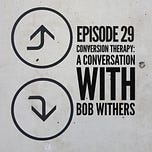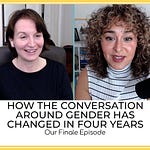Jungian Analyst Bob Withers joins us to discuss the differences between gay conversion therapy and gender identity conversion therapy. We examine the possibility of misinformed therapists “transing the gay away” and suggest that perhaps the dark history of conversion therapy may not be over. Bob delves into his view of psychosomatic symptoms and draws on his background in philosophy and medical history to understand our current fixation with one’s subjective sense of identity. Bob also defines what he calls “detrans-phobic” responses to the experiences of detransitioners.
Links:
Winnicott: http://web-facstaff.sas.upenn.edu/~cavitch/pdf-library/Winnicott_PsycheSoma.pdf
Dr Az Hakeem:
http://www.drazhakeem.com/publications/
Vsauce Video: The Power of Suggestion:
https://www.youtube.com/watch?v=QDCcuCHOIyY&feature=emb_title
Safeguard evidence-based therapy for children struggling with gender dysphoria:
Transgender Medicalization and the attempt to evade psych distress:
https://onlinelibrary.wiley.com/doi/10.1111/1468-5922.12641
The Seventh Penis: towards effective psychoanalytic work with pre-surgical transexuals
Cambridge Books:
Transgender Children and Young People: Born in Your Own Body:
https://www.cambridgescholars.com/product/978-1-5275-0398-4
Inventing Transgender Children:
https://cambridgescholars.com/product/978-1-5275-3638-8
One Size Does Not Fit All: In Support of Psychotherapy for Gender Dysphoria
https://link.springer.com/article/10.1007/s10508-020-01844-2
Extended Notes
A little bit about Bob and his work.
Bob met a biological man, now a woman, who wanted to detransition. He realized that becoming a woman did not solve his psychological problems. This was in 1990.
Bob’s work would later spark a new set of clients and now Bob sees parents and gender dysphoria teens.
How were the narrates about gender different back then?
Bob’s first detransition client was attacked and vilivided by the community. He tried to write books about it, but the only way to get the bullying to stop was to say he made up the whole thing.
This was the first time Bob saw de-trans phorbia.
We know the mind through introspection, but we actually know the body through a different way; measurement and observation.
If we change someone’s mind, is that considered conversion therapy? What about their body?
What is conversion therapy? And what does it mean in this context?
No therapist would actively support conversion therapy.
Now we’re faced with a new problem: gender conversion therapy.
Therapists are faced with a hard problem. Should they talk their patient through their gender dysphoria/their hatred of their body? Or is that considered gender conversion therapy? Where is the line?
Those who identify as trans also might be dealing with same-sex attraction. Converting to the opposite sex might feel more culturally acceptable and they can now safely be in a hetrosexual relationship.
In the trans world, changing your mind is seen as an untouchable space. However, we change our minds all the time!
There have been so many cases where people, now in their early 20s, regret transitioning all together as a young child.
What distressed 16 year old really knows what’s best for them? Trans children, now young adults, say they should have been questioned and challenged.
Can you be ex-gay?
There are so many complications between transitioning and de-transitioning.
Most people talk about the importance of being your true self, but very few people actually realize the vast medical implications.
In Bob’s experience, what makes someone better is their psychology with themselves.
We are so willing to turn our bodies over to science to be experimented on. “Oh, just cut this body part off.” “Oh, just take this hormone.” We need to take this stuff much more seriously because things go wrong all the time.
Interested to know more? Feel free to connect with Bob!
This podcast is partially sponsored by ReIME, Rethink Identity Medicine Ethics:
Learn more about our show: Linktr.ee/WiderLensPod











